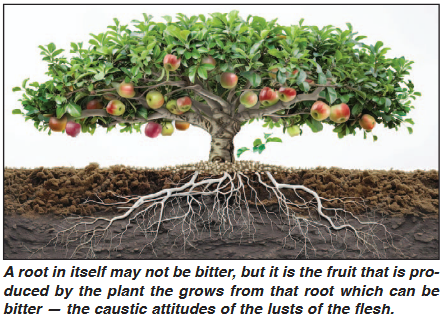
Avoid the Root of Bitterness!
This Insidious Evil Can Disrupt and Destroy Individuals and Fellowships
We as God’s people are called out of this world because of His love for us. Our great Creator made us in His image so we might ultimately, upon our calling, conversion, and resurrection, become the Kings and Priests that will fulfill the very purpose for our creation (I John 4:7-12; John 6:44; Genesis 1:27; Revelation 5:10). It is that love which the Eternal first revealed to us at our calling that identifies us to the world as His people:
“A new commandment I give to you, that you love one another; as I have loved you, that you also love one another. By this all will know that you are My disciples, if you have love for one another” (John 13:34-35).
This love, or agape in Greek, is the God-plane affection that we express towards God Himself and to our brethren. It is an all-encompassing preference for them above all others in the world, and it is the opposite of fear (“perfect love casts out fear”; I John 4:18) and bitterness, as we shall soon see.
The Root of Bitterness
 The attitude of bitterness is described in four places in the New Testament, but in particular in Hebrews 12:15 where it is coupled with “root.” Let us read this verse in its context:
The attitude of bitterness is described in four places in the New Testament, but in particular in Hebrews 12:15 where it is coupled with “root.” Let us read this verse in its context:
“Pursue peace with all people, and holiness, without which no one will see the Lord: looking carefully lest anyone fall short of the grace of God; lest any root of bitterness springing up cause trouble, and by this many become defiled; lest there be any fornicator or profane person like Esau,who for one morsel of food sold his birthright. For you know that afterward, when He wanted to inherit the blessing, he was rejected, for he found no place for repentance, though he sought it diligently with tears” (Hebrews 12;14-17).
root = rhiza, “a root (literally or figuratively).”
bitterness = pikros, “acridity (especially poison), literally or figuratively.”
Bitterness is also used in Acts 8:23 (Simon Magus having a “gall of bitterness”), Romans 3:14 (the unrighteous having “mouths full of cursing and bitterness,” taken from Psalm 10:7), and Ephesians 4:31 (admonishing to put away bitterness, wrath, anger, clamor, malice, and evil speaking). The same word pikros is used in every case.
The reference to bitterness in Hebrews 12:15 is directly related to Deuteronomy 29:18-19:
“… so that there may not be among you a man or woman or family or tribe whose heart turns away from the Lord our God, to go and serve the gods of these nations, and that there may not be a root bearing bitterness or wormwood; and so it may not happen when he hears the words of this curse, that he blesses himself in his heart, saying, ‘I shall have peace, even though I follow the dictates of my heart’ — as though the drunkard could be included with the sober.”
Verse 20 continues by warning that the Lord would burn with anger against such a person who “follows the dictates of his own heart,” and “his name would be blotted out from under heaven.” It is obvious that a “root bearing bitterness” here is an attitude of following the designs of one’s own heart, not that of God’s. It is a major matter!
Plants and Fruit From Roots
While roots are emphasized here as being associated with bitterness, it is really what grows from the roots that is implied. The metaphorical relationship of a plant to an attitude shows that a root, which germinates from a seed, supports a shoot that reaches upward from the soil and then feeds the root with the energy it receives from sunlight and carbon dioxide. The roots then grow and permeate the soil of one’s life, further enabling a growing plant to produce bitter, acrid, caustic, unsavory fruit — the fruit we identify as lusts of the flesh. These include a long list of traits: adultery, fornication, lewdness, hatred, contentions, jealousies, envy, selfish ambitions, and others (Galatians 5:19-21).
The root that brings forth bitter fruit has been skillfully identified by John Piper in What is the “root of bitterness”? (Desiring God, April 1, 1997, www.desiringgod.org):
 “It is a person who has a wrong view of eternal security. He feels secure when he is not secure. He says, ‘I shall be safe [secure], though I walk in the stubbornness of my heart.’ He misunderstands the covenant God makes. He thinks that because he is part of the covenant people, he is secure from God’s judgment. This kind of presumption is what the book of Hebrews deals with repeatedly — professing Christians who think they are secure because of some past spiritual experience [a ‘born again’ event] or some present association with Christian people.”
“It is a person who has a wrong view of eternal security. He feels secure when he is not secure. He says, ‘I shall be safe [secure], though I walk in the stubbornness of my heart.’ He misunderstands the covenant God makes. He thinks that because he is part of the covenant people, he is secure from God’s judgment. This kind of presumption is what the book of Hebrews deals with repeatedly — professing Christians who think they are secure because of some past spiritual experience [a ‘born again’ event] or some present association with Christian people.”
The book of Hebrews in four places tries to warn people of such presumptions, to not neglect such a great salvation and to fight the fight of overcoming every day and avoid becoming hardened against the faith by this sin-filled world (Hebrews 2:3; 3:12-14; 6:4-7; 10:23-29).
The words of Hebrews 12:14-17 warn us to indeed strive for peace with everyone, and for the holiness [hagiasmos, “purity”] that will enable us to see the Father and Christ at the resurrection. Thus, this “root of bitterness” is a person or doctrine within the ecclesia that encourage people to act presumptuously, and treats salvation as automatic without having to fight one’s human nature and the pulls of the world every day in the pursuit of holines.
It is interesting that Paul in Hebrews 12:16-17 goes on to bring up the case of Esau, who proved to be a profane person who sold his birthright for a bowl of soup. He thought that because of his firstborn status he could get away with selling his birthright for a miserable bowl of soup, but still obtain it in the end. Though he sought that firstborn blessing diligently with tears, he still was rejected, in the same way that a person professing to be a Christian, unless he diligently serves the Creator every day in pursuit of holiness, will be rejected from the firstfruits reward of the resurrection.
Causes of Bitterness
Bitterness can stealthily arise within your inner being in several ways, first in small portion by increasing over time — like a root that expands its reach into the soil of your life. Here are some causes:
1. Unresolved trauma or conflict. You may have experienced the loss of a job, a friend who deserted you, a divorce, or some other difficulty with people. Or, you could have gone through a financial crisis that left you bitter from unjust circumstances of life.
2. Unmet expectations. When things do not go as expected we may feel disappointment or resentment, which can evolve into bitterness if not addressed. Perhaps the job is not going well, a spouse or friend is not living up to expectations, or the world’s leaders are failing to serve the citizens but rather go to war with their enemies.
 3. Perceived injustice. Perhaps you think your boss is treating you unfairly, not giving you an expected raise, or you think God has not healed a mate, child, or friend from a serious disease. You may think justice has not been served, and you have been belittled.
3. Perceived injustice. Perhaps you think your boss is treating you unfairly, not giving you an expected raise, or you think God has not healed a mate, child, or friend from a serious disease. You may think justice has not been served, and you have been belittled.
4. Comparison and envy. By comparing yourself with others you may appear inadequate or helpless, inferior or undesireable. Such perceived shortcomings can breed resentment and a sense of victimhood, which if dwelled upon can breed bitterness.
As A. Rogers once said (www.crosswalk.com):
“The world is full of people who have not dealt with an old hurt. They look for things to criticize, people to find fault with, and ways to justify the way they feel. Have you ever seen people who are hypercritical? Generally they are bitter people. They know how to push your hot buttons until you react in a way to further justify their bitterness. Then they can say, ‘Aha! I was right: I have a right to be bitter.’”
How Bitterness Is Manifested, and Its Consequences
 Perhaps you have never considered that you may be a victim of bitterness. Yet, it is very common in this sin-filled world, and can creep up on you insidiously, unsuspectedly, especially when you are under stress. Notice the following symptoms of bitterness:
Perhaps you have never considered that you may be a victim of bitterness. Yet, it is very common in this sin-filled world, and can creep up on you insidiously, unsuspectedly, especially when you are under stress. Notice the following symptoms of bitterness:
- Negative thoughts and feelings toward others
- Difficulty in forgiving others or oneself
- Holding on to grudges
- Feeling like a victim
- Being resentful
- Engaging in gossip or revenge
Any of these symptoms signal bitterness in your thoughts, and will lead to a host of consequences that are highly detrimental to your spiritual walk. Notice the following:
Relationship problems. Bitterness can poison your relationship with another person, be it your spouse, family member, friend, or supervisor.
Physical and mental health issues. Chronic bitterness leads to all sorts of health problems, such as stress, depression, headaches, pain, and immune suppression then can lead to cancer and infectious diseases.
Missed opportunities. A bitter spirit can limit the joy and energy of living, leading to one’s failure to enjoy the companionship of others who might enrich your life. Employers might reject you because of your negative attitude.
Spiritual limitations. Living with bitterness will limit your joy and purpose in living, and compromise forgiveness and love in dealing with others.
Separation of brethren. It is all-too-common for a bitter person within a fellowship to cause division. I have seen this happen up-close. A person feels mistreated or belittled by a brother or sister in Christ, and rather than go to that person in a spirit of love and forgiveness, the embittered person slyly sows supposed injustices experienced by this person in the minds of others, winning over the allegiance of others in the fellowship and arming them with information — oftentimes lies — that implicate the accused party of great evils. These “snared” brethren align themselves with the bitter person and avoid the accused brother or sister, dividing the congregation. The mutual love the brethren should have, which identifies them as God’s people (John 13:35), is suppressed by such narcissistic maneuvering, and the joy of brethren dwelling together in unity is compromised (Psalm 133).
Overcoming Bitterness
Getting rid of bitterness should be a prime enterprise in the life of any Christian.This evil root must be cast out, for unless it is it will continue to grow into the soil of your life, robbing it of the nutrients that ought to be producing the fruits of the spirit. It could even quench the spirit of repentance if left to consume a major portion of your life. How can this evil root be eradicated, utterly thrust out of your life?
1. Allow the Eternal to reveal the bitterness. You might say that you have no bitterness in your heart, but remember Jeremiah 17:9: “The heart is deceitful above all things, and desperately wicked; who can’know [yada, ‘to know”] it?” We frankly do not have a good grasp of the essence of our thoughts and attitudes, especially in comparison with the purity and love of the Creator’s mind. In fact, it is the fool who believes he always has the answers — is right in his own eyes (Proverbs 12:15) — which means that a wise person will examine his own mind to see if he is truthful. This same verse continues, “But he who heeds counsel is wise.” We have a Creator who knows us inside and out:
“For the word of God is living and powerful, and sharper than any two-edged sword, piercing even to the division of soul and spirit, and joints and marrow, and is a discerner of the thoughts and intents of the heart” (Hebrews 4:12).
The Eternal can reveal our inner thoughts to us, but we need to ask Him. A deceitful heart cannot reveal a deceitful heart. The Eternal Living God can reveal if you have any bitterness in you through humble prayer, study of His word, fasting, and by wise counsel with trusted brethren.
 2. Bury the hurts that cause bitterness. It is never right to respond to any sort of abuse you may have endured by becoming bitter. Go to the person face-to-face and “… tell him his fault between you and him alone. If he hears you, you have gained your brother” (Matthew 18:15). Most likely there was no intentional sin against you by this person, and as a result of your meeting the potential source of division will be removed. We have the additional instruction, if the offending person will not hear you, to next go to him along with two or three witnesses, and at last resort, if the person still will not listen to your complaint, you should bring up the difficulty in front of the entire congregation (Matthew 18:16-17).
2. Bury the hurts that cause bitterness. It is never right to respond to any sort of abuse you may have endured by becoming bitter. Go to the person face-to-face and “… tell him his fault between you and him alone. If he hears you, you have gained your brother” (Matthew 18:15). Most likely there was no intentional sin against you by this person, and as a result of your meeting the potential source of division will be removed. We have the additional instruction, if the offending person will not hear you, to next go to him along with two or three witnesses, and at last resort, if the person still will not listen to your complaint, you should bring up the difficulty in front of the entire congregation (Matthew 18:16-17).
Even if the offending person is removed from the congregation it is incumbent upon us to forgive him, to follow Jesus’ example when He spoke of the Roman soldiers and others responsible for crucifying Him, “Father, forgive them, for they do not know what they do” (Luke 23:34). Notice what Peter said in I Peter 2:19-20:
“For this is commendable, if because of conscience toward God one endures grief, suffering wrongfully. For what credit is it if, when you are beaten for your faults, you take it patiently! But when you do good and suffer, if you take it patiently, this is commendable before God.”
This is not saying you cannot pray for trouble to come upon those enemies who intentionally harm you. David in Psalm 69:24 stated, “Pour out your indignation upon them [his adversaries], and let your wrathful anger take hold of them.” He stated similar imprecatory pronouncements in other places as well, but he himself did not mete out justice upon these profligates; he asked God, the perfect Judge, to mete out justice upon them. David’s hope was for these intentional enemies to repent and ask forgiveness, not for himself to hold them in bitterness.
If someone has wronged you and you have not solved the issue by the Matthew 18 formula, just ask the Eternal to forgive the person; then forget it. You can bury the hurt in the “grave of God’s forgetfulness,” even as He has removed our sins and shortcomings as far as the east is from the west (Psalm103:12). Do not let bitterness gain a foothold in you. Forgive! Let God be the judge if someone does evil to you, and return evil with good, that you might heap coals of fire on his head (Romans 12:14-21).
3. Replace any bitterness with goodness. This process is essential, for without forgiveness and the removal of bitterness it will be impossible to achieve the resurrection. As we read earlier:
“Pursue peace with all people, and holiness, without which no one will see the Lord” (Hebrews 12:14).
One cannot continue nourishing the roots of the bitter fruit in a soil that is unbalanced, compacted, and bereft of moisture. The roots must be those of righteousness, of lawful living, for “all the commandments are righteousness”(Psalm119:172).
“A man is not established by wickedness, but the root of the righteous cannot be moved” (Proverbs 12:3).
“… that He would grant you, according to the riches of His glory, to be strengthened with might through His spirit in the inner man, that Christ may dwell in your hearts though faith; that you, being rooted [rhizoo, ‘to root’] and grounded in love, may be able to comprehend with all the saints what is the width and length and depth and height — to know the love of Christ which passes knowledge; that you may be filled with all the fulness of God” (Ephesians 3:16-19).
“As you therefore have received Christ Jesus the Lord, so walk in Him, rooted [rhizoo] and built up in Him and established in the faith, as you have been taught, abounding in it with thanksgiving”(Colossians 2:6-7).
You must forgive others to allow peace to reign, to wipe out any root of bitterness. As A. Rogers wrote:
“But, you say, ‘Look what they’ve done! I am not going to let them off the hook.’ Well, they are not on the hook — you are! When you forgive you set two people free, and one of them is yourself.”
Do not entertain a root of bitterness for even a moment. Do not let it sink its insidious web of evil into your life. Discover if it resides in you, and rid yourself of it! Forgive, forgive, and forgive. Do not let this pernicious parasite reside anywhere in your mind and spirit, for it will consume your goodness and separate friends and fellowships. Instead, allow roots of righteous to permeate your soil of living, that sweet, fragrant, wholesome fruit will abound and fill the world around you with joy and peace!

